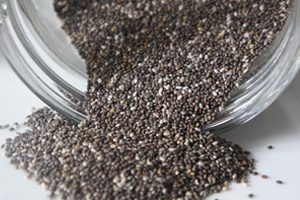Several reports suggest that chia seeds are highly beneficial for diabetics. But, how does it really work?
If you have a loved one who is diabetic or you have been diagnosed with diabetes, you must have heard about the importance of exercise and diet for diabetes. There are numerous reports and evidence about people who have been able to control type 2 diabetes or at least improve their health by adhering to the right diet and exercise. Therefore, we cannot deny the fact that proper nutrition helps improve the health of diabetics.
What is Chia Seed?
Chia is one of a few complete protein plants and is commonly found growing naturally in Central America, Guatemala, and Mexico. It is also known as California Sage, California Chia or Salvia Hispanic.
 Chia seeds are very rich in minerals, proteins, vitamins, antioxidants, omega-3 fats and fiber. This is the main reason why it’s considered a super-food. This basically means that it’s a nutrient-rich food with numerous health benefits. More and more people are consuming chia seeds as they come aware of its benefits resulting from its nutritional value.
Chia seeds are very rich in minerals, proteins, vitamins, antioxidants, omega-3 fats and fiber. This is the main reason why it’s considered a super-food. This basically means that it’s a nutrient-rich food with numerous health benefits. More and more people are consuming chia seeds as they come aware of its benefits resulting from its nutritional value.
The number of people (including children) being diagnosed with diabetes worldwide is growing at an alarming rate. However, rather than resigning yourself to simply live with this debilitating disease, you should understand that there are ways to control and manage this diabetes and eating chia seeds is just one of them.
Chia Seeds Nutritional Profile
One of the main reasons why chia is so beneficial is because it’s rich in minerals, omega-3, vitamins, protein and fiber.
For instance 28 grams (one ounce) of chia seeds contains:
- 6 grams fiber
- 137 calories
- 4 grams protein
- 3 grams carbohydrates
- 6 grams fat
- 65 milligrams phosphorus (27% DV)
- 6 milligram manganese (30% DV)
- 1 milligram copper (% DV)
- 8 milligrams potassium (1% DV)
- 1 milligram copper (3% DV)
Chia seeds are also a rich source of antioxidants and they also contain essential fatty acids linoleic and alpha-linoleic acid; vitamins A, B, E and D; mucin; strontium; and minerals including magnesium, niacin, manganese, iodine, sulphur and iron.
What are the Benefits of Chia Seeds for Diabetes?
- Improves Insulin and Glucose Tolerance
In a study in diet-induced obese rats, a high fructose, high fat diet was fed to one group of rats and the other group of rats was fed a high fructose, high fat diet along with chia oil and chia seeds. The group of rats that was fed a high fat, high fructose (sugar) diet developed insulin resistance, oxidative stress and glucose intolerance just like humans would if they fed on a typical diet high in sugar and processed foods.
However, the other group which was fed a high fructose, high fat diet along with chia oil and chia seeds didn’t develop such problems. In fact, it was the opposite and quite remarkable. Chia seeds helped improve insulin and glucose resistance and restore their bodies’ antioxidant system.
- Reduce Diabetes Swelling – Chia Reduces Inflammation
Numerous studies show that inflammation is the main cause of many health conditions including diabetes. One of the main nutrients that have been extensively studied for anti-inflammatory effects is omega-3. Chia seed is rich in Omega -3 which comes from alpha-linoleic acid. Although alpha-linoleic acid does not convert to EPA and DHA (usable forms), as well as eating fish such as salmon, it still provides benefits.
On the other hand, chia is rich in dietary fiber which is also an anti-inflammatory agent and this contributes to chia’s anti-inflammatory power.
- Rich in Anti-Oxidants
The high antioxidant capacity of chia seeds prevents the sensitive fats from going rancid. Anti-oxidants also help prevent oxidative stress and free radicals and damage to the body. Remember, free radicals damage body cells and lead to the development of various conditions. Chia seeds donate stable molecules to free radicals in order to make them normal once again and prevent further damage and decline in health.
- Improves Cardiovascular Risk Factors
A randomized control trial conducted in 2007 took two groups of people with type 2 diabetes and gave one group 37 grams of wheat and the other group was given 37 grams of chia seeds per day for 12 weeks.
The group that was given chia had a reduction hs—CRP of 40 percent (an inflammatory agent that is commonly seen in cardiovascular disease), a reduction in SBP (systolic blood pressure) and a decrease in A1C. Reductions in CRP and SBP indicate significant improvements especially in cardiovascular risk factors.
Research shows that chia does not have any harmful effects for diabetics. Therefore, it’s perfectly fine to include it in your every other day or every day diet routine.
